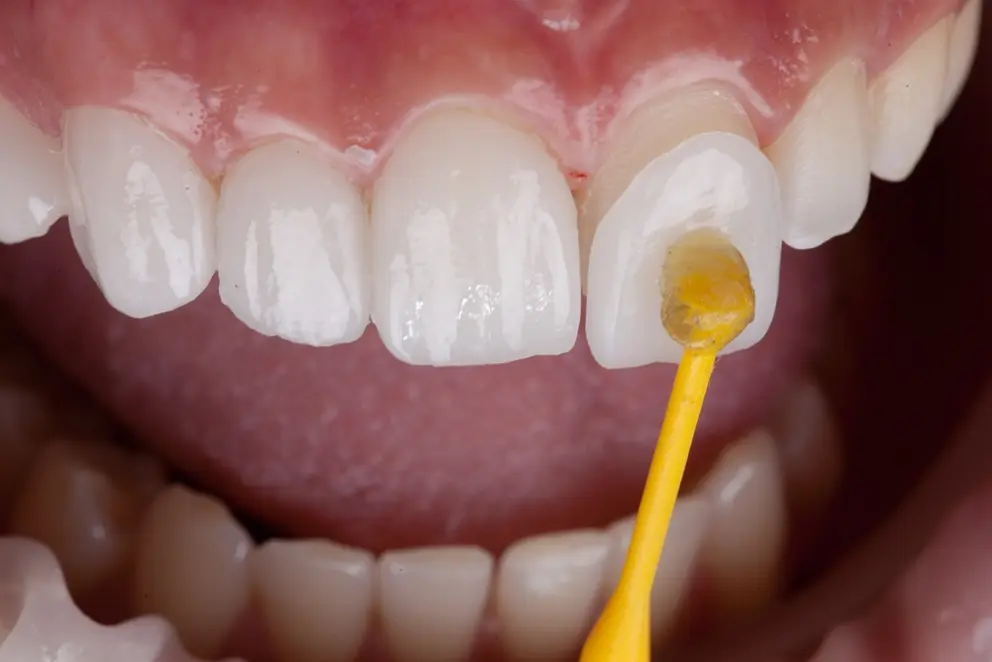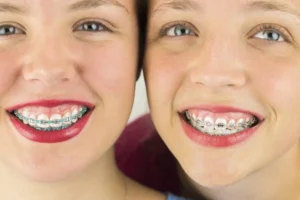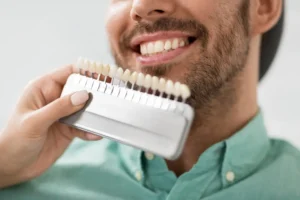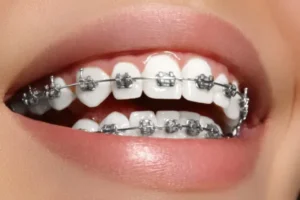How Much do Veneers Cost?
When comparing the cost of dental veneers and braces, veneers often have a lower initial cost. Typically, veneers can range from $800 to $2,500, depending on their type. On the other hand, braces can cost between $1,700 and $9,000, depending on the treatment method.
However, it’s important to consider the longevity of each option. If you use a prescribed retainer correctly, braces can last a lifetime. Veneers, though, usually need replacement every ten years, or every 20-30 years with good care.
So, when you calculate all costs, veneers might end up being more expensive than braces. But if a cosmetic dentist determines that veneers are the best choice for your oral health, it’s a worthwhile investment.
Remember, the Dental veneers vs. braces cost comparison is just one factor to consider. You should also think about stain resistance and the different types of veneers available.

What Happens To Teeth Under Veneers?
Dental veneers and braces are not invincible shields. They don’t miraculously shield your teeth from every damage. They are not replacements for comprehensive orthodontic treatment.
Plaque, tartar, and other contaminants can still accumulate around your natural teeth. This buildup can increase your risk of serious health problems like periodontitis and cavities.
Maintaining good oral hygiene is crucial for the lifespan of veneers and braces. Brushing and flossing regularly can help ensure perfect smiles in the long term. These are important treatment options to consider for your dental health.
This can shorten the lifespan of both the veneer and the natural tooth. While they don’t worsen your risk of suffering contamination, dental veneers alone don’t improve that risk either. To maximize the lifespan of both your teeth and veneers, we highly advise that you:
- Brush at least twice a day, for two minutes at a time.
- Gargle mouthwash, or sea salt water, for at least 30 seconds to disinfect.
- Wear an occlusal guard if you suffer from bruxism.
- Moderate intake of acidic foods & drinks, like citrus fruits, coffee, or soda.
- Moderate intake of sugary foods & drinks.
- Don’t smoke; tobacco can stain the teeth and weaken gum health.
- Visit your dentist twice a year to perform a deep dental cleaning.
So, like braces, veneers will not place you at greater risk of oral health issues, but they will not totally protect you from them either. They can still happen if you aren’t careful, so in any case, remain diligent.

What Are the Disadvantages of Veneers?
Disadvantages of dental veneers: they’re not a full replacement for orthodontic treatment due to certain limitations. Understanding these drawbacks is crucial for informed decision-making in oral care. However, do they possess any clear disadvantages? Well, in certain contexts, dental veneers can have disadvantages, including:
- Immobility: As we’ve stated before, properly bonded veneers alone will NOT move the tooth, which doesn’t make them ideal for fixing wider gaps.
- Irreversibility: To apply veneers, the orthodontist will often need to reshape or remove the outer layer of enamel before installation. Since you can’t add or regrow that enamel, you’ll continually have to get replacement veneers for the rest of your life. So, veneers are removable, but you can’t fully walk back the procedure if you regret it.
- Cost: As stated above, braces and orthodontic appliances typically cost a few thousand dollars to install and maintain across the board, but it can cost that much to do that with dental veneers per tooth. Also, since veneers are widely viewed as a cosmetic procedure, many dental insurance plans are far less likely to cover them than they are to cover traditional braces.
- Color: Not only are veneers not totally immune to staining and discoloration, but there’s no guarantee that they’ll identically match the color of your teeth. If you’re planning on whitening your teeth, it’s best to do the whitening before you install your veneers.
- Condition: If your teeth and gums are too weak, then that could weaken the bonding of the dental veneers. Alternatively, unlike braces, veneers usually cannot be fixed if they chip or crack. This means that the entire layer will have to be swapped out and replaced.
Veneers and crowns can enhance your smile and offer some protection. They can also correct minor gaps. However, for severe malocclusions, braces, Invisalign, and orthodontic treatments are the only proven solutions. Veneers can’t fully replace these treatments.
Once a veneer procedure is done, it’s irreversible. The tooth changes forever after the enamel is filed down for veneer installation. This requires lifetime maintenance and veneer replacements. Without them, you risk gum disease, hypersensitivity, gum inflammation, flossing issues, and chronic pain.
The irreversibility of veneers is a major concern. That’s why we don’t recommend them as a substitute for orthodontic treatment. However, bear in mind, whether you’re using braces or veneers, they’re merely instruments. The responsibility of using them correctly lies with you.
If you’re unsure about the best tool for your oral health needs, consult an experienced, licensed orthodontist. They can provide additional guidance, support, and resources to help you decide.
In making the choice between braces or veneers, consultation with an orthodontist is crucial. They can create a treatment plan tailored to your needs. Whether it’s wearing braces for 15 years, or understanding what veneers requires, they can guide you. They can explain the benefits of lingual braces, ceramic braces, and how they can contribute to a beautiful smile.
They can also advise on how to prevent tooth decay, manage gaps between teeth, and avoid grinding your teeth. Remember, the goal is a healthy, beautiful smile that lasts a lifetime.






